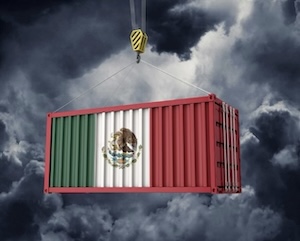Mexico’s Evolving Trade Scenario Amidst Global Tariff Tensions
By Brenda Cordova and Brendita Cordova, Braumiller Law Group Mexico Legal Counsel
From a Mexican resident’s perspective, who is also involved in international trade, it appears that since the Trump administration took office, the global economic scenario has been altered by an escalating trade war, characterized by the imposition of tariffs by the U.S. government, on a range of countries. These measures, intended to safeguard the U.S. interests, have affected the relationships with certain international markets, as the U.S. is showing signs of progressive isolationist practices.
In this global scenario, Mexico, one of the U.S. biggest commercial allies, is also under the threat of these tariffs as we have continued to see 90-day extensions since April 2nd. In a letter sent to Mexico’s President Claudia Sheinbaum on July 11th, Trump repeatedly floated the idea of imposing a Tariff of 30% on Mexican imports effective on August 1st, arguing that “Mexico still has not stopped the Cartels who are trying to turn all of North America into a Narco-Trafficking Playground”. This rhetoric has increased the uncertainty for Mexican exporters / importers and is raising fears of disruption in several industries.
In response to this announcement, Marcelo Ebrard, Mexico’s Secretary of Economy, created a task force with several authorities and industry leaders, with the purpose of strategizing the best way to reach an agreements that can persuade President Trump to not apply these tariffs. Ebrad has stated that these tariffs represent an “unfair treatment”, and Mexico of course does not agree with them.
President Claudia Sheinbaum announced that on July 31st, 2025 she had spoken once again with President Trump and that during their conversation, Trump agreed to extend the terms of their previous deal for an additional 90 days, in this manner, Mexico will continue to pay the previously established 25% Fentanyl Tariff, 25% on cars, and 50% on Steel, Aluminum and Copper, and Sheinbaum has agreed to terminate its Non-Tariff Barriers. This extension is intended to establish a long-term agreement grounded in open dialogue and sustained communication between the two nations. Sheinbaum referred this is a good deal for Mexico because duties are not increased, the USMCA is safeguarded and the duties remain the same for the automotive, steel and aluminum sector.
Nonetheless, considering of course a possible negative outcome from these negotiations another strategy from Mexico to support investment and trade, is to maintain negotiations with other economies such as Canada, Brazil, China and the European Union with the purpose of raising investments among these countries and implementing diversification strategies in various other markets: Earlier this week, Claudia Sheinbaum announced that during a conversation held with the Canadian Prime Minister, Mark Carney, both acknowledged how important it is to respect the USMCA trade agreement, and shared their experiences regarding the letters received from President Trump. (I would love to have heard this first hand) To date, both countries have agreed to strengthen their commercial ties and are scheduling a visit by the Canadian Prime Minister to Mexico to deepen the commercial ties and address the current trade challenges.
Also, at the start of the year, Mexico and the European Union agreed to update their free trade agreement that has been in place since 2000. This move is part of the various strategies to counter U.S. tariffs and will increase European exports in sectors like financial services, transport, e-commerce, and telecommunications, while encouraging investment into Mexico, the European Union’s second-largest Latin American trading partner. The agreement also covers agro-food exports, eliminating nearly 100% tariffs on sensitive goods like cheese, meat, pasta, apples, chocolate, and wine, and will also streamline administrative procedures.
In the case of Brazil, Latin America’s largest economy, and one of the most significantly affected by Trump’s tariffs, it has initiated professional talks with Mexico to expand their 2002 trade agreements. These negotiations aim to identify shared opportunities and address external threats more effectively. So far, diplomacy arrangements have been limited to formalities such as the in-person visit from Brazil’s vice president Geraldo Alckmin to Mexico City in August, to explore business opportunities that will help with the growth of commercial flow.
On the other hand, China’s relationship with Mexico is complex. It is now the main trading partner with Latin American countries except Mexico, where it ranks second after the U.S., accounting for 20% of imports. But because of Trumps tariffs imposed to China, a lot of companies have opted to relocate their manufacturing operations into Mexico to take advantage of the commercial facilities that the USMCA has to offer, representing investment and economic growth opportunities for Mexico. However, the importation of Chinese goods is starting to overtake the Mexican market affecting the country’s economy. To protect its interests, the Mexican government has started to impose tariffs on some of these imports like textiles and footwear, with the purpose to increase national production to keep providing jobs and protecting the national economy.
Faced with this situation, Mexico strategies are focused to bolster its economy through increased foreign investment and diversified trade partnerships, but it must also contend with the challenge of protecting its domestic industries from being overwhelmed by external competition. While pursuing agreements with major global economies and encouraging the inflow of capital, Mexican policymakers are careful to implement safeguards and negotiate terms that prevent oversaturation of their markets. Despite this, Mexico prioritizes its free trade agreement with the United States, but current conditions demand action. This delicate balance ensures that growth does not come at the expense of local enterprises or economic sovereignty.
thisRead more articles by this author: https://www.braumillerlaw.com/author/brenda-cordova/

